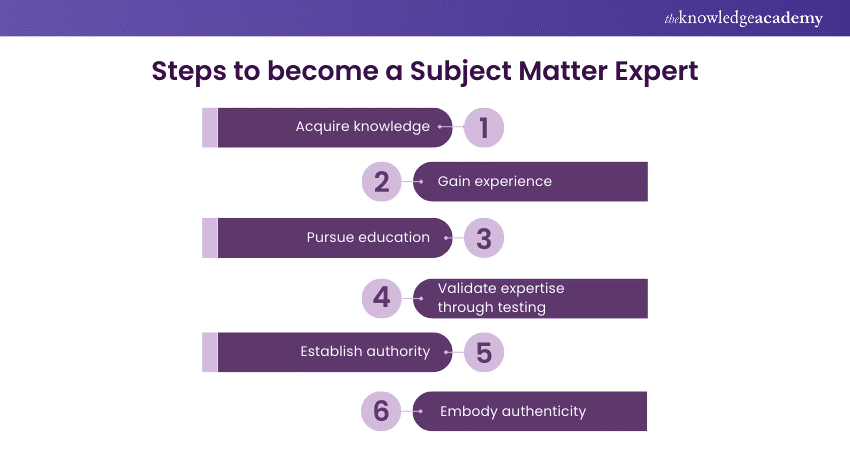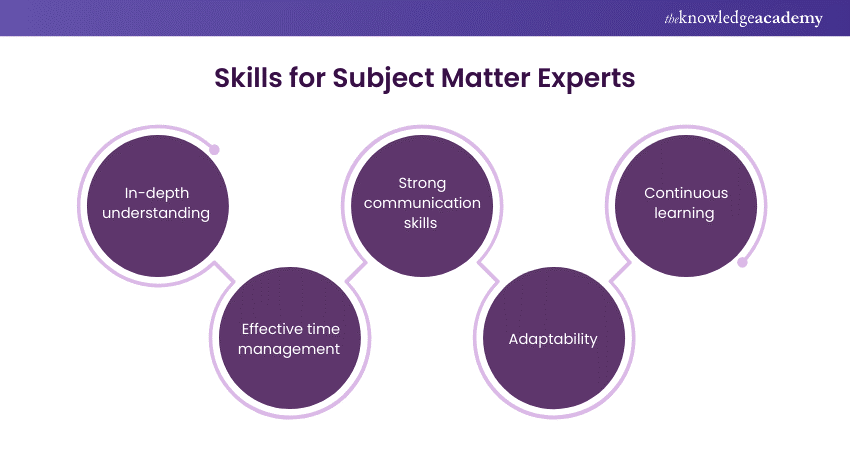We may not have the course you’re looking for. If you enquire or give us a call on 01344203999 and speak to our training experts, we may still be able to help with your training requirements.
Training Outcomes Within Your Budget!
We ensure quality, budget-alignment, and timely delivery by our expert instructors.

Do you want to acquire expert skills to thrive in the competitive workspace? The competitive scenario looks for professionals with expertise that sets them apart from the rest. Given this context, turning into a Subject Matter Expertise holds major significance. Wondering How to Become a Subject Matter Expert and boost your potential?
In this blog, we will take you through the crucial aspects on How to Become a Subject Matter Expert and synthesise insights that can influence decisions. Curious to know more? Let' dive in to become the expert you aspire to be.
Table of Contents
1) What is a Subject Matter Expert?
2) What does a Subject Matter Expert do?
3) Steps to become a Subject Matter Expert
4) Skills for Subject Matter Experts
5) Examples of Subject Matter Experts
6) Conclusion
What is a Subject Matter Expert?
A Subject Matter Expert (SME) is someone with profound knowledge, expertise, and experience in a specific field or subject area. Their extensive understanding and skill set make them valuable resources sought after for insights, guidance, and problem-solving within their domain.
SMEs are essential in providing specialised knowledge and solutions. They use their deep understanding and expertise to promote creativity, growth, and excellence in their specialised professions.
What does a Subject Matter Expert do?
Subject Matter Experts play an important role in various industries and professions. They may be involved in providing consultation, training, research, or content creation within their area of specialisation. SMEs are frequently relied on to resolve challenging issues, make wise choices, and progress in their field.
Refine coaching skills for impactful training experiences. Elevate your career with our Coaching Skills Training!
Steps to become a Subject Matter Expert
Here are the important steps to embark on the route to become a Subject Matter Expert:

1) Acquire knowledge
Getting thorough knowledge and comprehension of the subject is the first step towards becoming a Subject Matter Expert. This might involve going to classes, reading books, and doing workshops. Engaging with professionals in the field can also help you learn insightful information and improve your understanding of the subject.
2) Gain experience
Becoming a Subject Matter Expert requires a great deal of experience. Look for ways to use your expertise in real-world situations, such as projects, freelancing jobs, or internships. Gaining real-world experience can not only improve your knowledge but also provide you with insightful new ideas.
3) Pursue education
Maintaining current knowledge regarding developments and breakthroughs in your area requires ongoing learning. To strengthen your position as a Subject Matter Expert and broaden your knowledge, think about going after specialised training courses, postgraduate degrees, or certifications.
4) Validate expertise through testing
Seek opportunities to validate your expertise through examinations, assessments, or certifications offered by reputable organisations or institutions. Achieving recognised credentials can serve as tangible evidence of your proficiency and expertise in your chosen field.
5) Establish authority
By actively participating in debates, offering ideas, and establishing connections with other experts, you may increase your authority and reputation within your business or area. Creating articles and participating in online forums are all effective means of enhancing your position as a specialist on a specific subject.
6) Embody authenticity
Being authentic is essential for establishing trust and credibility as a Subject Matter Expert. In all your interactions and communications, be sincere, open, and truthful. Being genuine will make you relatable to your audience and set you out as a reliable authority in your field.
Enhance Assertiveness Skills Training for confident communication. Join today for career advancement! 0
Skills for Subject Matter Experts
Following are the key skills that characterise Subject Matter Experts:

SMEs possess a comprehensive understanding of their subject, often acquired through years of study and experience. This deep knowledge allows them to provide accurate and reliable information, making them a valuable resource in decision-making processes.
2) Effective time management
Subject Matter Experts must manage their time efficiently to juggle various commitments and maintain organisation. They prioritise tasks effectively to ensure optimal productivity and goal achievement.
3) Strong communication skills
Subject Matter Experts rely on clear and effective communication. They use both written and verbal means to convey their ideas, insights, and recommendations to diverse audiences. This foster understanding and collaboration within their field.
4) Adaptability
Subject Matter Experts must be adaptable to navigate the ever-changing landscape of their industry. They need to embrace new trends, technologies, and challenges, adjusting their strategies and approaches to remain effective and competitive.
5) Continuous learning
Subject Matter Experts recognise the importance of lifelong learning in staying relevant and effective in their fields. They actively look for ways to increase their knowledge and abilities while keeping up with the most recent innovations.
Achieve professional success by mastering the Effective Communication Skills Course - join now for impactful learning!
Examples of Subject Matter Experts
The following are examples of Subject Matter Experts across different industries showcasing their expertise and contributions to their respective fields.
1) Social Media Marketer
A social media marketer is skilled in raising brand exposure across a range of social media platforms and achieve specific company goals. To maximise brand impact and reach, they effectively access digital landscapes through specific advertisements and strategic content creation.
2) Search Engine Optimisation (SEO) Expert
The area of expertise of an SEO Specialist consists of optimising websites and content to enhance their Search Engine Results Pages (SERPs) rankings. To increase organic search performance and send relevant traffic to websites, they use a wide range of approaches.
3) Affiliate marketer
By promoting products through their exclusive affiliate links, affiliate marketers can profit from successful recommendations and sales. To increase sales conversions and revenue generation, they use digital platforms to interact with audiences and direct traffic to related products.
4) Software Developer
A Software Developer is a specialist for developing, building, and maintaining software systems. Taking advantage of tools for development and programming languages, they produce efficient and helpful software solutions that are modified to meet particular demands and requirements.
5) User Experience (UX) Designer
A UX Designer specialises in crafting user-friendly experiences for digital products, prioritising usability, accessibility, and aesthetics. They ensure that users can interact seamlessly with the product, enhancing satisfaction and engagement.
6) Network Architect
A Network Architect specialises in crafting intricate network infrastructures, guaranteeing peak performance, robust security, and scalability. They design and implement systems to meet organisational needs, optimising efficiency and reliability within the network environment.
7) Productivity Consultant
A Productivity Consultant can help people and businesses improve their processes, systems, and procedures. Their primary goal is to improve performance and success by increasing productivity and efficiency through the application of effective strategies and tools.
8) Diversity Consultant
A Diversity Consultant focuses on fostering diversity, equity, and inclusion in organisations. They provide guidance on policies, practices, and initiatives aimed at creating inclusive environments where all individuals feel valued and respected.
9) Management Consultant
A Management Consultant specialises in offering strategic guidance and solutions aimed at enhancing organisational performance, efficiency, and effectiveness. They analyse activities, identify areas in need of growth, and provide recommendations to optimise business processes and achieve strategic objectives.
Refine mentoring skills for impactful training. Elevate your career with our comprehensive Mentoring Training!
Conclusion
Embarking on the journey of How to Become a Subject Matter Expert necessitates dedication, perseverance, and a commitment to lifelong learning. By following the outlined steps and developing essential Subject Matter Expert skills, you can establish authority in your field. Additionally, you can contribute to your community and industry, making a meaningful impact.
Elevate your training skills with our comprehensive Train the Trainer Course!
Frequently Asked Questions

Subject Matter Experts in a field may be biased, have narrow perspectives, or use outdated information. They might find it difficult to keep up with changes in their profession or to explain things to those who aren't particularly knowledgeable about the subject.

Subject Matter Experts provide specialised guidance, solutions, and knowledge in their areas. They support growth and knowledge within organisations while advancing businesses, problem-solving, and innovation.

The Knowledge Academy takes global learning to new heights, offering over 30,000 online courses across 490+ locations in 220 countries. This expansive reach ensures accessibility and convenience for learners worldwide.
Alongside our diverse Online Course Catalogue, encompassing 17 major categories, we go the extra mile by providing a plethora of free educational Online Resources like News updates, Blogs, videos, webinars, and interview questions. Tailoring learning experiences further, professionals can maximise value with customisable Course Bundles of TKA.

The Knowledge Academy’s Knowledge Pass, a prepaid voucher, adds another layer of flexibility, allowing course bookings over a 12-month period. Join us on a journey where education knows no bounds.

The Knowledge Academy offers various blogs on Train the Trainer, including Coaching Skills Training, Mentoring Training Course, Coaching and Mentoring Training Course and more. These courses cater to different skill levels, providing comprehensive insights into Reverse Mentoring.
Our Business Skills Blogs cover a range of topics related to Train the Trainer, offering valuable resources, best practices, and industry insights. Whether you are a beginner or looking to advance your Business skills, The Knowledge Academy's diverse courses and informative blogs have you covered.
Upcoming Business Skills Resources Batches & Dates
Date
 Coaching and Mentoring Training Course
Coaching and Mentoring Training Course
Fri 13th Sep 2024
Fri 15th Nov 2024
Fri 31st Jan 2025
Fri 4th Apr 2025
Fri 13th Jun 2025
Fri 22nd Aug 2025
Fri 24th Oct 2025
Fri 12th Dec 2025







 Top Rated Course
Top Rated Course



 If you wish to make any changes to your course, please
If you wish to make any changes to your course, please


